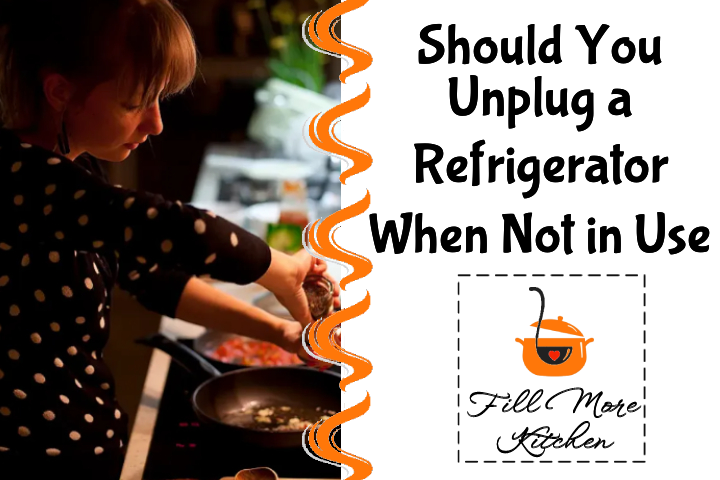As the new year begins, and people prepare to travel, they often clean out their kitchens, including throwing away perishables and taking out the trash. However, some may also question whether or not they should unplug their refrigerator.
Unplugging your refrigerator when not in use is usually unnecessary as refrigerators consume relatively low energy and cost less than $100 per year to operate, making it impractical to expect significant savings from unplugging. Moreover, refrigerators are designed to run continuously, and their lifespan is prolonged when they do so.
Unplugging your refrigerator may be necessary in certain situations. Below, we will discuss these scenarios, the proper way to do it, and the potential consequences.
How Long Can You Leave a Refrigerator Unplugged?
To determine when it is necessary to unplug your refrigerator, it is essential to comprehend the functioning of your refrigerator and how this operation can be disrupted by unplugging it.
The compressor in refrigerators is responsible for circulating the cooling agent and keeping them cool, and it is intended to operate continuously.
If you decide to unplug your refrigerator, the compressor will stop working, and the cooling agent will settle, but this state of being “off” won’t cause any damage to either the compressor or the refrigerator, which means that there is no specific time limit for how long a refrigerator can stay unplugged.
Obviously, if there are any items of food still kept inside the refrigerator, they must be taken out in case the appliance is going to be left unplugged for an extended period.
When Is It Worth Unplugging Your Refrigerator?
As previously mentioned, refrigerators are intended for continuous operation, therefore it is generally illogical to disconnect them solely because they are not being utilized. Nonetheless, there are a couple of exemptions:
Extended Vacations
Unplugging your refrigerator along with other appliances when you are away for more than four weeks can be a wise decision to minimize the chances of electrical fires during your absence.
Refrigerator Malfunction
If the refrigerator is not able to maintain its coolness, it could be due to a malfunctioning compressor. In such cases, if the motor keeps trying to start but fails, there is a possibility of an electrical fire. Therefore, it is advisable to unplug the appliance for safety reasons until it gets repaired or replaced.
Cleaning
If you want to thoroughly clean your refrigerator, it is possible to temporarily disconnect it from the power source. It is important to meticulously clean all parts of the appliance, ensure they are completely dry, and allow the doors to remain open for a brief period of time so that the refrigerator can properly ventilate. Once you have finished cleaning, simply plug it back in.
Will My Refrigerator Leak If I Unplug It?
If you have experienced any of the situations mentioned above, it is probable that you have made the choice to disconnect your refrigerator. As a result, the cooling mechanism will cease to operate, and over time, the temperature inside the refrigerator will rise to match that of the room.
When considering whether to unplug your refrigerator when not in use, you may wonder if it will leak without power. However, the truth is that simply being unplugged does not cause a refrigerator to leak. Nevertheless, there are certain parts of the refrigerator that require proper maintenance to prevent leakage.
Self-defrost
When unplugging a refrigerator or freezer with a defrost feature, it is important to note that the drains responsible for removing water from the freezer may continue to function for some time, particularly if they are obstructed; therefore, it is recommended that you inspect the defrost drains, which are usually situated at the back of the freezer.
Condensation pan
Similar to air conditioners, refrigerators eliminate moisture from the atmosphere while circulating coolant. This moisture condenses and flows into the refrigerator’s condensation tray, where it evaporates when the unit is operational because of the heat generated by the motor located near the pan.
If the refrigerator‘s motor is not functioning, such as when it is unplugged, there is a possibility that water may not evaporate and cause overflow. To prevent this, you can remove the pan from the front grill of your refrigerator, empty any water present, clean it thoroughly, and put it back in place.
Forgotten iceÂ
When not in use, it’s easy to forget to turn off the ice maker and remove the tray, but leaving it plugged in can result in room temperature ice which is essentially water; therefore, it’s important to clean out the ice maker before unplugging your refrigerator.
What To Do When Unplugging a Refrigerator
If you decide to disconnect your refrigerator for an extended period or while waiting for repairs, there are a few precautions to follow:
- It is important to fully disconnect the plug from the wall socket when unplugging a refrigerator, as simply turning off the socket will not suffice and the appliance will remain connected to the electrical source.
- It is important to empty your refrigerator of all food before unplugging it. According to the CDC, any food left in a refrigerator that is not functioning for more than 4 hours, a half-full freezer for 24 hours, or a full freezer for 48 hours should be thrown away. If you plan on leaving your refrigerator unplugged for an extended period, it is best to dispose of the food to prevent any unwanted smells or pests.
Does Unplugging a Refrigerator Damage It?
Simply unplugging your refrigerator for short periods, such as during vacations, will not cause any harm to the appliance. This is similar to other kitchen devices like a toaster that can be unplugged without causing damage.
Nevertheless, if you hastily plug in your refrigerator after unplugging it, this could lead to an overload on the compressor, which will have to work harder to circulate the cooling gas throughout the appliance.
Leaving the refrigerator plugged in for extended periods can result in motor overload and failure, so it is recommended to unplug it for a minimum of 15 minutes before plugging it back in to prevent this situation.
Should You Unplug a Refrigerator If It’s Not Working?
If your refrigerator is not cooling correctly, there could be several reasons for it. Conducting a few straightforward tests can help you determine whether the issue is with the appliance or the power source.
- When you open the door and the unit light turns on, it indicates that the power is functioning properly.
- If you suspect an overloaded compressor is causing issues with your refrigerator, a simple test involves unplugging the unit from the power source for at least 15 minutes, then plugging it back in and waiting a few minutes to see if cold air begins circulating again, indicating that the compressor is functioning correctly.
- If your refrigerator is not working properly, you can try unplugging it and leaving it for 24 hours, but only if it’s not too inconvenient to remove all the food inside. This may help melt any ice that has formed on the coils, which could be preventing proper cooling. If the refrigerator starts working again after being plugged back in, then the issue might be a defective defrost controller that requires replacement.
If your refrigerator is not working correctly while still plugged in, it is advisable to disconnect it to avoid the risk of an electrical fire that could result from defective parts.
To put it briefly, it is advisable to keep your refrigerator connected to the power source, even when not being utilized, since it is constructed to operate continuously throughout the day and night.
If your refrigerator is not working correctly or you plan to be away for a month or longer, it’s essential to take the necessary steps to unplug the appliance, remove all food and ice, and wait at least 15 minutes before plugging it back in to prevent any damage.
You can also check this video about “Should You Unplug a Refrigerator When Not in Use?”
Check out our 10 reviews!
Related posts
https://fillmorekitchen.com/how-can-you-tell-if-steak-has-gone-bad/
https://fillmorekitchen.com/how-to-keep-a-bagel-with-cream-cheese-fresh/
https://fillmorekitchen.com/can-i-leave-my-rice-cooker-unattended/
https://fillmorekitchen.com/can-wine-glasses-go-in-the-dishwasher/
https://fillmorekitchen.com/can-you-eat-pizza-left-out-overnight/



